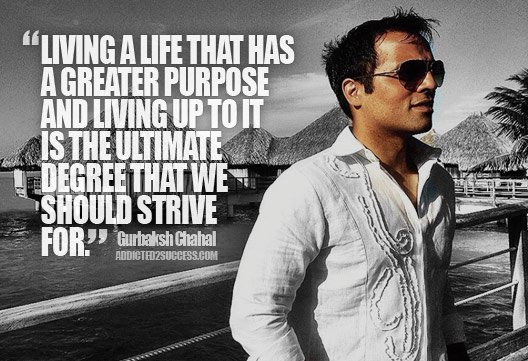I was watching a documentary called Nothing To Lose about the Co-founder of Visalus, Ryan Blair, and heard something that really caught my attention:
In 1806, the definition of Success in the Webster dictionary was to be fortunate, happy, kind and prosperous. In 2013 the definition of success is the attainment of wealth, fame and power.
This change in the definition of success tells a great deal about society and how we have steadily glamorized wealth and power. The popularity of television shows about entrepreneurship and successful entrepreneurs touting their successes in books and podcasts have assisted many aspiring entrepreneurs to actually take the leap of faith. However, they have also helped formed a new wave of entrepreneurs who create products with the wrong intention – to make a lot of money.
These entrepreneurs feel that they can start a business and be successful by simply making a lot of money before ever realizing that should never be the end goal. Wealth should be the fortunate consequence of achieving other goals, not the ultimate goal.
Daymond John recently spoke at the University of Florida and lead an inspiring talk about his formation of FUBU and all the ups and downs of the company. He went from having nothing to getting $300,000 in purchase orders with no way to make that much product. He didn’t have grandiose illusions of extreme wealth – he had passion.
Instead of looking at this as an insurmountable challenge he attempted to get bank loans in an attempt to fund his purchase orders, Daymond was denied by every single bank before his mother told him she could refinance her home and that Daymond could use it as a warehouse to manufacture FUBU clothing. He put the work in because he was passionate about FUBU.
In a few years FUBU grew to be the powerhouse-clothing brand that it is now, but Daymond lost sight of his true mission – to create an awesome company that could better his family’s lives – and instead saw the attainment of wealth as his end-all goal.
After realizing his mistake he rectified it by continually keeping track of his goals every year. His advice to a student that asked what sort of company they should create was that they should start the one that they would do for free.
This is something all entrepreneurs must realize.
The purpose of forming a company is not to obtain substantial wealth.
In fact a friend, Tim Forrest, who owns a consulting company that has worked with Unilever, Famous Amos and other multinational corporations; suggests the vast majority of successful entrepreneurs don’t own Ferraris or dress in $10,000 suits.
The majority of entrepreneurs put everything back into their companies.
They don’t buy lavish purchases and get into massive debt – they leave that to the MBAs. The life of extreme wealth is confined to only the top entrepreneurs and not only is unrealistic, but is the wrong goal to follow.
The entrepreneurs who now can pay cash for $250,000 cars are the ones who started companies they were passionate about.
These entrepreneurs experienced nearly insurmountable challenges in their companies and only succeeded because they never gave up.
If there were only a monetary goal most of the richest men in the world would have never made it. Entrepreneurship is just too difficult to simply do it for the accumulation of wealth.
As entrepreneurs we need to change our definition of success. We cannot get caught up in the glitz and glamour of fame and fortune. We need to make an effort to create companies that do the world good and further our internal missions to be the best we can be.
Andrew Birkett is a marketing major at the University of Florida. He owns and operates an automotive photography company, Holeshot Heroes, and is developing an automotive themed trading card game under the same brand. Holeshot Heroes combines many of his passions for cars, games and giving back to charity by donating 10% of profits to charity.
Related Post: Suffering From Success Meme



